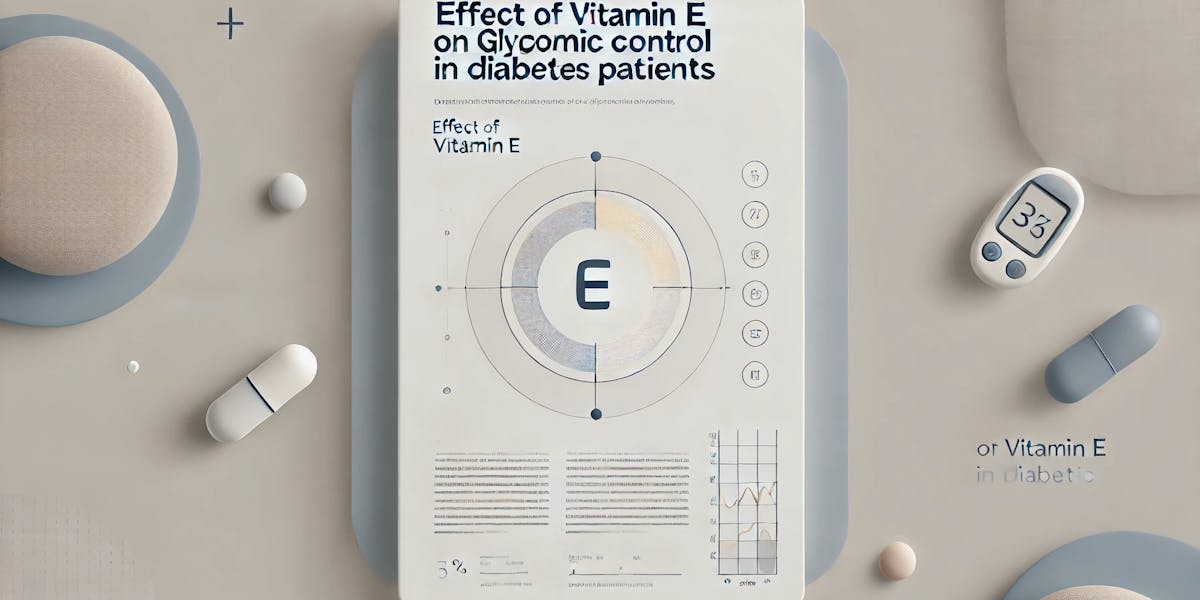Effect of Vitamin E on Glycemic Control in Diabetic Patients
Nutrition Journal

Summary
This systematic review and meta-analysis assessed the effect of vitamin E supplementation on glycemic control and insulin resistance in diabetic patients. The analysis included 38 randomized controlled trials (RCTs) with a total of 2,171 diabetic patients. The results indicate that vitamin E intake significantly improved HbA1c, fasting insulin, and insulin resistance (HOMA-IR), but had no significant effect on fasting blood glucose. Short-term interventions (<10 weeks) showed a lowering effect on fasting blood glucose. The findings suggest that vitamin E supplementation can be beneficial in improving insulin resistance and glycemic control among diabetic patients. However, the effects varied depending on the duration of the intervention and the type of diabetes. The study calls for further research to confirm these findings and explore optimal dosing strategies.
Study Design
Interventions
Study Type
Outcomes
Duration and Size
Study Population
Age Range
Sex
Geography
Other Criteria
Methodology
The study systematically reviewed RCTs evaluating vitamin E supplementation in diabetic patients. It employed a random-effects model to calculate mean differences in glycemic indices and insulin resistance markers.
Studies were identified from PubMed, Scopus, and Web of Science, with strict inclusion criteria focusing on RCTs that examined fasting blood glucose, HbA1c, fasting insulin, and HOMA-IR.
Interventions
Vitamin E supplementation was tested in various forms and dosages, with most studies using alpha-tocopherol. The interventions ranged from 90 to 1620 mg/day.
Most interventions lasted between 4 and 52 weeks, with significant improvements in HbA1c and insulin resistance observed in short-term studies.
Key Findings
Vitamin E significantly improved HbA1c and insulin resistance but had no effect on fasting blood glucose. Short-term interventions were more effective in lowering fasting blood glucose levels.
Comparison with other Studies
This meta-analysis builds on previous research by including newer RCTs. Compared to the 2014 meta-analysis, this study finds stronger evidence supporting vitamin E’s role in improving insulin resistance.
Journal Reference
Asbaghi O, Nazarian B, Yousefi M, et al. Effect of vitamin E intake on glycemic control and insulin resistance in diabetic patients: an updated systematic review and meta-analysis of randomized controlled trials. Nutr J. 2023;22:10. doi:10.1186/s12937-023-00840-1
Related and Discussions
Vitamin E, Its Beneficial Role in Diabetes Mellitus (DM) and Its Complications
Combined Effect of High-Dose Vitamin A, Vitamin E Supplementation with Zinc on Glycemic Control in Type 2 Diabetes
Effect of Vitamin E Intake on Glycemic Control and Insulin Resistance in Diabetic Patients: A Meta-Analysis
Effects of Vitamins C and E and β-Carotene on the Risk of Type 2 Diabetes Mellitus: Results from the Women's Antioxidant Cardiovascular Study
Effect of vitamin E intake on glycemic control and insulin resistance in diabetic patients: an updated systematic review and meta-analysis of randomized controlled trials
Influence of Vitamin E Supplementation on Glycaemic Control: A Meta-Analysis of Randomised Controlled Trials
Effects of vitamin E supplementation on glycaemic control in type 2 diabetes mellitus: a meta-analysis of randomised controlled trials
Recomendaciones de micronutrientes, vitaminas y antioxidantes en diabetes mellitus
Vitamin E Treatment in Insulin-Deficient Diabetic Rats Reduces Cardiac Arrhythmias and Mortality During Severe Hypoglycemia
Supplementing Antidiabetic Drugs with Chromium, Vitamin C, Vitamin E, or Coenzyme Q10 Improved Glycemic Control
Stay informed. Stay ahead.
Subscribe now for the latest breakthroughs, expert insights, and cutting-edge updates in diabetes care—delivered straight to your inbox.